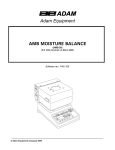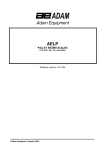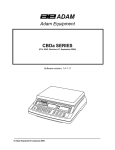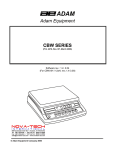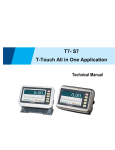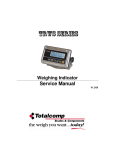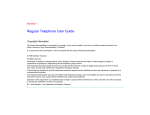Download Acer 800 Laptop User Manual
Transcript
Adam Equipment CFW SERIES (P.N. 6162, Revision A5, May 2006) Software Version: V1.04 @Adam Equipment Company 2006 @Adam Equipment Company 2006 CONTENTS 1.0 INTRODUCTION............................................................................................................3 2.0 SPECIFICATIONS .........................................................................................................4 3.0 INSTALLATION..............................................................................................................6 3.1 LOCATING THE SCALES ..........................................................................................6 3.2 LIST OF ACCESSORIES ...........................................................................................6 3.3 SETTING UP THE SCALES.......................................................................................7 4.0 KEY DESCRIPTIONS ....................................................................................................8 5.0 DISPLAYS .....................................................................................................................9 6.0 OPERATION ................................................................................................................10 6.1 ZEROING THE DISPLAY .........................................................................................10 6.2 TARING ....................................................................................................................10 6.3 WEIGHING A SAMPLE ............................................................................................11 6.4 PARTS COUNTING .................................................................................................11 6.5 CHECK-WEIGHING .................................................................................................13 6.5 ACCUMULATED TOTAL..........................................................................................14 7.0 USER PARAMETERS .................................................................................................16 8.0 BATTERY OPERATION ..............................................................................................19 9.0 RS-232 INTERFACE....................................................................................................20 9.1 INPUT COMMANDS FORMAT ................................................................................21 10.0 CALIBRATION .............................................................................................................22 11.0 SERVICE SECTION ....................................................................................................23 11.1 CFW FACTORY PROGRAMMING AND CALIBRATIONS.......................................23 12.0 ERROR CODES ..........................................................................................................26 13.0 REPLACEMENT PARTS AND ACCESSORIES ..........................................................27 14.0 SERVICE INFORMATION ...........................................................................................27 @Adam Equipment Company 2006 1 @Adam Equipment Company 2006 2 1.0 INTRODUCTION • The CFW series of scales provide an accurate, fast, versatile series of general purpose weighing scales with counting and check-weighing functions. • There are 2 series of scales- CFW scales are kilogram only scales and the CFWa scales offer changeable unit from pounds to kilograms. The scales share the same functions but special instructions will be given for the CFWa series to be able to change the weighing units. • There are 4 models in each series with the maximum capacities up to 600 kg /1320 lb. • They all have stainless steel weighing platforms on a Steel base assembly and a display module mounted on a pillar attached to the base. • All the keypads are sealed and have colour coded membrane switches. • The displays are large easy to read liquid crystal type displays (LCD). The LCD’s are supplied with a backlight. • All units include automatic zero tracking, audible alarm for pre-set weights, automatic tare and an accumulation facility that allows the individual weights to be stored and recalled as an accumulated total. • The scales have an optional bi-directional RS-232 interface for communicating with a PC or printer. @Adam Equipment Company 2006 3 2.0 SPECIFICATIONS CFW SERIES Model # Maximum Capacity Readability Repeatability (Std Dev) Linearity ± Tare Range Platform Size Overall Dimensions (w x d x h) Net Weight Units of Measure CFW 60 CFW 150 CFW 300 CFW 600 60 kg 150 kg 300 kg 600kg 5g 5g 10 g 10 g 20 g 20 g 50g 50g 10 g -60 kg 20 g 40 g -150 kg -300 kg 425 mm x 525 mm 425 mm x 700 mm x 950 mm 100g -600kg 600 mm x 800 mm 600 mm x 925 mm x 970 mm 15 kg 45 kg kg, g kg CFWa SERIES Model # CFW 130a Maximum Capacity Readability 130 lb/ 60 kg 0.01 lb/ 5g 0.01 lb/ 5g 0.02 lb/ 10 g -130 lb/ -60 kg Repeatability (Std Dev) Linearity ± Tare Range Platform Size Overall Dimensions (w x d x h) Net Weight Units of Measure CFW 330a CFW 660a 330 lb/ 150 kg 0.02 lb/ 10 g 0.02 lb/ 10 g 0.04 lb/ 20 g -330 lb/ -150 kg 16.7" x 20.7" / 425mm x 525mm 425mm x 700mm x 950mm 16.7" x 27.6" x 37.4" 660 lb/ 300 kg 0.05 lb/ 20 g 0.05 lb/ 20 g 0.10 lb/ 40 g -660 lb/ -300 kg / CFW 1320a 1320 lb/ 600 kg 0.1 lb/ 50 g 0.1 lb/ 50 g 0.2 lb/ 100 g -1000 lb/ -600kg 23.6" x 31.5" / 600mm x 800mm 600mm x 925mm x 970mm / 23.6" x 36.4" x 38.2" 33 lb / 15 kg 99 lb / 45 kg Lb / oz / kg / g / lb:oz @Adam Equipment Company 2006 Lb / oz / kg / lb:oz 4 Common Specifications Interface RS-232 bi-directional Interface (Optional) Stabilisation Time 2 seconds typical Operating Temperature 0°C - 40°C 32°F - 104°F Power supply 9 VDC, 800 mA from external power supply Internal re-chargeable battery (up to 70 hours operation) Calibration Automatic External Display 1 x 6 digits LCD digital display Balance Housing Indicator: ABS Plastic Top pan: Stainless Steel Base: Cast Aluminium for all models except Mild Steel for CFW 600 (CFW 1320a) Applications General Purpose Floor Weighing Scales Functions Weighing, Parts counting, Memory Accumulation, Pre-set weighing with alarm @Adam Equipment Company 2006 5 3.0 INSTALLATION 3.1 3.2 LOCATING THE SCALES • The scales should not be placed in a location that will reduce the accuracy. • Avoid extremes of temperature. Do not place in direct sunlight or near air conditioning vents. • Avoid unsuitable tables. The table or floor must be rigid and not vibrate. • Avoid unstable power sources. Do not use near large users of electricity such as welding equipment or large motors. • Do not place near vibrating machinery. • Avoid high humidity that might cause condensation. Avoid direct contact with water. Do not spray or immerse the scales in water. • Avoid air movement such as from fans or opening doors. Do not place near open windows or airconditioning vents. • Keep the scales clean. Do not stack material on the scales when they are not in use. LIST OF ACCESSORIES Your packet contains9 9 9 9 9 9 9 9 AC adapter Indicator Metal base Stainless Steel pan Tubular pillar with top flanges Bottom Bracket 4 Bolts and 2 set screws Instruction manual @Adam Equipment Company 2006 6 3.3 SETTING UP THE SCALES • The pillar is attached to the base using a bracket that must be attached to the base frame first using the 4 bolts supplied. The pillar is secured to the bracket using 2 sets of screws. The cable from the base to the indicator module is run through the tube and taken out through the plastic support at the top. Excess cable can be stored within the tube. • The CFW Series comes with a stainless steel platform packed separately. Place the platform in the base. • Level the scale by adjusting the four feet. If the scale rocks re-adjust the feet. • Attach the indicator module to the pillar by sliding it over the bracket with the flanges engaged in the groves on the base. Attach the cable from the base to the connector on the rear of the indicator. • Attach the power supply module to the connector on the side of the indicator. Press the [On/Off] key. The software revision number will be displayed followed by a self-test showing all digits before the zero is displayed along with the unit of weight that was selected last. @Adam Equipment Company 2006 7 4.0 KEY DESCRIPTIONS [Zero] or Sets the zero point for all subsequent weighing. The display shows zero. A secondary function is of "Enter" key used when setting up the value for the Parameters. [Tare] or Tares the scale. Stores the weight currently on the scale as tare value, subtracts the tare value from the gross weight and shows the results. A secondary function is of incrementing the active digit when setting a value for Parameters. [Pcs] Selects parts counting. Used to set the sample quantities while parts counting. A secondary function is to move the active/flashing digit to the left when setting values for the Parameters. [Unit] or [U] Selects the weighing unit to be displayed from those which are enabled. See parameter F2 in section 7. @Adam Equipment Company 2006 8 A secondary function is to move the active/flashing digit to the right when setting values for the Parameters. [Func] or [F] Selects the Functions of the scale. If the scale is weighing, it will select parts counting. If it is not in weighing mode, it will return the user to weighing. A secondary function (C) is to act as a clear key when setting values for Parameters. [Print/M+] or Sends the results to a PC or a Printer using the RS232 interface. It also adds the value to the accumulation memory if the accumulation function is not automatic. A secondary function (ESC) is to return to normal operation when the scale is in a Parameter setting mode. [On] and [Off] To switch on and switch off the indicator. 5.0 DISPLAYS The LCD display will show a value and a unit to the right of the digits. In addition there are labels for TARE, GROSS weight, ZERO, Stable and for Low battery @Adam Equipment Company 2006 9 6.0 OPERATION 6.1 ZEROING THE DISPLAY • You can press the [Zero/Enter] key at any time to set the zero point. This will usually be necessary when the platform is empty. When the zero point is obtained the display will show an indicator for zero. • The scale has an automatic re-zeroing function to account for minor drifting or accumulation of material on the platform. However you may need to press the [Zero/Enter] key to rezero the scale if small amounts of weight are shown when the platform is empty. 6.2 TARING • Zero the scale by pressing the [Zero/Enter] key if necessary. The “ZERO” indicator will be ON. • Place a container on the platform, a value for its weight will be displayed. • Press the [Tare/Ï] key to tare the scale. The weight that was displayed is stored as the tare value and that value is subtracted from the display, leaving zero on the display. The "GROSS" indicator will be OFF and "TARE" indicator will be ON. As a product is added only the net weight of the product will be shown. The scale could be @Adam Equipment Company 2006 10 tared a second time if another type of product was to be added to the first one. Again only the weight that is added after taring will be displayed. • When the container is removed a negative value will be shown. If the scale was tared just before removing the container this value is the gross weight of the container plus all products that was removed. The “ZERO” indicator will be on to indicate that the platform is back to the same condition as it was when the [Zero/Enter] key was last pressed. • To delete a Tare value, press [Tare/Ï] when the pan is empty. 6.3 WEIGHING A SAMPLE To determine the weight of a sample, first tare the empty container if it is to be used and then place the sample in the container. The display will show the net weight of the sample and the units of weight currently in use. 6.4 PARTS COUNTING • Before starting, tare the weight of any container that may be used, leaving the empty container on the scale. Place a known number of samples in the container, if used. The number should match the options for parts counting, i.e., 10, 20, 50, 100 or 200 pieces. • When the scale is showing weight, pressing the [Pcs] key will start the parts counting function. • The scale will show "P 10" asking for a sample size of 10 parts. Change the sample size to the desired quantity by pressing the [Tare/Ï] key. It will cycle through the options: 10, 20, 50, 100, 200 and back to 10. @Adam Equipment Company 2006 11 • Press the [Zero/Enter] key again when the number matches the number of parts used as the sample. As more weight is added the display will show the number of parts (pcs). • Pressing the [Pcs] key will display the unit weight (g/pcs), pressing it second time will display the net weight (pcs and kg) and the third time, it will be the count again (pcs). • Press the [Func/C] key to return to normal weighing or to start counting a different sample. @Adam Equipment Company 2006 12 6.5 CHECK-WEIGHING Check-weighing is a procedure to cause an alarm to sound when the weight on the scale meets or exceeds values stored in memory. The memory holds values for a high and a low limit. Either or both can be used. See PARAMETERS Section for the procedure. To set the limits, "F0 H-L" is used. After limits have been set the Check-weighing function is enabled. When a weight is placed on the scale the arrows will show if the weight is above or below the limits and the beeper will sound as described below. BOTH LIMITS SET The display will show OK and the beeper will sound when the weight is between the limits. LOW LIMIT SET HIGH LIMIT is set to zero The display will show OK and the beeper will sound when the weight is less than the Low Limit. Above the Low Limit the display will show HIGH and the beeper will be off. HIGH LIMIT SET LOW LIMIT is set to zero The display will show LOW and the beeper will be off when the weight is less than the High Limit. Above the High Limit the display will show OK and the beeper will be on. BOTH LIMITS SET. LOW IS SET GREATER THAN HIGH The beeper will never sound and the display will show LOW if the weight is less that the LOW limit, and HIGH if the weight is greater than the Low Limit. NOTE: Weight must be more than 20 scale divisions for checkweighing to operate. @Adam Equipment Company 2006 13 Checkweighing facility can be set up during Weighing or Parts Counting by entering values as Low or/and High Limits keyed in by the user. The limits are displayed in kg or pcs respectively. Checkweighing during Weighing Checkweighing during Parts Counting To disable the Check-Weighing function enter zero into both limits by pressing the [Func/C] key when the current limits are shown then pressing [Zero/Enter] to store the zero values. 6.5 ACCUMULATED TOTAL • The scale can be set to accumulate manually by pressing the [Print/M+] key. See the PARAMETER Section for details of setting the Parameter "F5 PRT". The accumulation function is only available when weighing. It is disabled during parts counting. • The weight displayed will be stored in memory when the [Print/M+] key is pressed and the weight is stable. • The display will show "ACC 1" and then the total in memory for 2 seconds before returning to weighing. If the optional RS-232 interface is installed the weight can be output to a printer or PC. @Adam Equipment Company 2006 14 • Remove the weight, allowing the scale to return to zero and put a second weight on. Press the [Print/M+] key, the display will show "ACC 2", then the new total and finally the value of the second weight. No. of accumulation of weights Total weight for 3 accumulations • Continue until all weights have been added. • To view the total in memory press the [Print/M+] key when there is no weight on the scale. The display will show the number of entries and the total. See also the PARAMETER Section and use the Parameter "F1 TOL" to select to print or to clear the memory. @Adam Equipment Company 2006 15 7.0 USER PARAMETERS • The scale has 7 User Parameters that can be set by the user. To set these Parameters press the [Func] key. The display will show the first parameter, "F0 H-L". • Pressing the [Tare/Ï] will cycle through the other parameters. • Pressing [Zero/Enter] will allow you to enter a parameter directly for setting or further enter a sub-parameter. Press the [Print/Esc] key to leave the parameter unchanged. • For setting a new value for the parameter or a sub-parameter, first enter the parameter or sub-parameter by pressing the [Zero/Enter] key. Then use the [Pcs/Í] key or the [Units/Î ] key to move the active/flashing digit to the left or to the right and use the [Tare/Ï] key to increment the flashing digit. Press the [Zero/Enter] key to enter the changed value. • Use the [Print/Esc] key to leave the parameter. For example, When the display shows “F0 H-L”, press the [Zero/Enter] key. The display will show “SEt Lo” (the sub-parameter). Press [Zero/Enter] to set the low limit or press the [Tare/Ï ] to skip to “SEt Hi” for setting the high limit. When all digits have been set, press [Zero/Enter] to store the value. Display will go back to the subparameter just set, i.e. “SEt Lo” or “SEt Hi”. Press [Print/Esc] to return to “FO H-L”. Advance to the next parameter (F1 toL) by pressing [Tare/Ï] if needed or press [Print/Esc] to return to weighing. @Adam Equipment Company 2006 16 SETTING OF USER PARAMETERS PARAMETER SUBPARAMETER DESCRIPTION F0 H-L SEt Lo Sets a value for the Low Limit used for 000.000 checkweighing. Sets a value for the High Limit for 000.000 checkweighing. Clears the Accumulation Total in the memory without printing the results. Prints the Accumulation Total in the memory and then clears the memory. Prints the Accumulation Total in the memory but does not clear the memory. Enables or disables the weighing units. Use the [Zero/Enter] key to select the weighing unit to enable/disable. Use the [Tare/Ï] to change the unit to ON or OFF. Sets the date, Display will show the last date set or 00.01.01. Enter the new date, format is yy.mm.dd Sets the time, Display will show the current time Enter the new time, format is hh.mm.ss Sets clock to OFF or ON as screen saver. CLK oF SEt HI F1 toL to CLr to P-C to Prt F2 unt Ut oFF Ut on F3 tI SEt dA SEt tI F4 oFF CLoCK bL DEFAULT VALUE CLK oF CLK on Sets the backlight to be on, automatic or EL Au off EL on EL Au EL oFF bEEP @Adam Equipment Company 2006 Sets the beeper tobP 2 1 (off all the time), 2 (ON when the weight is OK, i.e., in between LO and HI limits) or 3 (ON only when the weight is outside the limits during the check-weighing function). This setting does not affect the beeper during normal weighing. 17 F5 Prt Sets the RS-232 - P bAUd-Select from the desired baud 4800 rates. Options are 600, 1200, 2400, 4800 and 9600 P nodE - Set the printing mode toP Cont P Prt (Print only when [Print] is pressed) P Cont (Print continuously) P Auto (Print automatically whenever there is any weight on the scale). Parity – Select from the following settings- n 8 1 n 8 1 -8 data bits, no parity E 7 1 -7 data bits, even parity o 7 1 -7 data bits, odd parity ProG Pin See the SERVICE SECTION for details. • Use the [Print/Esc] key to leave the set-up mode of the parameter and return to weighing. @Adam Equipment Company 2006 18 8.0 BATTERY OPERATION • The scales can be operated from the battery if desired. The battery life is approximately 70 hours. • When the battery needs charging a symbol on the display will turn on. The battery should be charged when the symbol is on. The scale will still operate for about 10 hours after which it will automatically switch off to protect the battery. • To charge the battery, simply plug the adaptor into the mains power. The scale does not need to be turned on. • The battery should be charged for 12 hours for full capacity. • Just under the display is an LED to indicate the status of battery charging. When the scale is plugged into the mains power the internal battery will be charged. If the LED is green the battery has a full charge. If it is Red the battery is nearly discharged and yellow indicates the battery is being charged. @Adam Equipment Company 2006 19 9.0 RS-232 INTERFACE The CFW Series of scales can be ordered with an optional RS-232 bi-directional interface. Specifications: RS-232 output of weighing data ASCII code 4800 Baud (600-9600 selectable) 8 data bits (8 data bits no parity, 7 data bits even and odd parity selectable) No Parity Connector: 9 pin d-subminiature socket Pin 2 Input Pin 3 Output Pin 5 Signal Ground Data Format for normal weighing operations, parts counting or recalling of totals from memory will all be different. Examples follow: Normal Output: No. 1 GS 12.340kg Total 12.340kg <lf> <lf> This number increments every time a new value is stored in memory GS for Gross weight, NT for net weight and a unit of weight The total value stored in memory Includes 2 line feeds @Adam Equipment Company 2006 20 When parts counting- the weight, unit weight and count will be printed: GS UW PCS <lf> <lf> 12.340kg 123.4g 100pcs GS for Gross weight, NT for net weight and a unit of weight The average piece weight computed by the scale The number of parts counted Includes 2 line feeds When recalling the Total weight stored in the accumulation memory the output format is: *************** TOTAL No. 5 Wgt 21.455 kg *************** 9.1 A line of stars is shown . INPUT COMMANDS FORMAT The scale can be controlled with the following commands. The commands must be sent in upper case letters, i.e. “T” not “t”. Press the Enter key of the PC after each command. T<cr><lf> Tares the scale to display the net weight. This is the same as pressing the [Tare] key. Z<cr><If> Sets the zero point for all subsequent weighing. The display shows zero. T12.5<cr><if> Same as entering a preset tare value of 12.5 from the keypad. P<cr><lf> Prints the results to a PC or printer using the optional RS-232 interface. It also adds the value to the accumulation memory if the accumulation function is not set to automatic. @Adam Equipment Company 2006 21 10.0 CALIBRATION The scale can be calibrated using the following procedure. For a more detailed method of calibrating the scale, it will be necessary to enter the secure Programming Menu. Refer to the CFW Service Manual for more information. The CFW scales calibrate using either metric or pound weights, depending on the weighing unit in use before calibration. The display will show either "kg" or "lb" to identify the weights expected. CFWa Scales only: CFWa scales will also have the lb, oz, lb-oz or kg (or g) indicator on to show the unit of the weight requested. If the scale was in pounds before starting the calibration, the weights requested will be in pound values. If the scale was weighing in kilograms then metric weights will be requested. PROCEDURE • Turn the power off. • Turn the power back on, during the counting from 1 to 0, press [Func/C]. • The display will show "CAL ". While it is showing "CAL " press the [Unit], [Print] and [Tare] keys in sequence to enter the Calibration section. The display will show "unLoAd". • Remove any weight from platform when stable and press [Zero/Enter]. • The display will show the last calibration weight used. If this is correct you can continue by pressing [Zero/Enter]. If it is not correct use the arrow keys to change the calibration weight value. When it is correct press [Zero/Enter]. • The display will show "LoAd". Place the calibration weight on the scale. Press the [Zero/Enter] key. • If the calibration is acceptable the scale will run a self-test during which the calibration weight should be removed. If an error message “FAiL L” is shown try calibration again as a disturbance may have prevented a successful calibration. After calibration the scale should be checked for whether the calibration and linearity is correct. If necessary repeat calibration, make sure that the scale is stable before accepting any weight. @Adam Equipment Company 2006 22 11.0 SERVICE SECTION To set the Service Parameters it will be necessary to enter the User Parameters as before and then use a password code while entering the programming parameter “PROG”. 11.1 CFW FACTORY PROGRAMMING AND CALIBRATIONS • The parameter “PROG” allows access to the calibration section. To enter this parameter press [Func] and then press [Tare/Ï] until "PROG" is displayed. • The Programming Parameter “PROG” has a number of sub-parameters that allow the scale to be customised for the application. The “P1 rEF” subparameter includes many functions that can affect the metrology of the scale. These functions should not be reset to other values unless you understand the affect it may have on the scale. • Press [Zero/Enter] when “PROG” is displayed to show " PIn ", requesting for the security password. • Press the [Units], [Func] and [Print] keys in sequence to enter the Programming/ Calibration menu. The display will show "P1 rEF". Press [Zero/Enter] to set the functions of “P1 rEF”. @Adam Equipment Company 2006 23 SETTING OF SERVICE PARAMETERS SUBPARAMETER FUNCTIONS DESCRIPTION DEFAULT SETTING P1 rEF AZn 0 Auto Zero operating range. (Options: 0.5d, 1.0d, 2d, 4d) 1d Sets the operational range of the auto zero function. 0-Auto Initial Zero range at power on. (Options: 0%, 2%, 5%, 10% and 20%) P1 10 (10%) Sets the range for setting a zero when power is applied. The total capacity of the scale will not be affected by the new zero if it is set within 10%. If it is set to a higher value, the scale may zero but the range may be limited by load cell, A/D converter or mechanical stops within the base. 0-rAnG Zero range when [Zero] is pressed. (Options: 4%,10%, 20%, 50%,100%) P2 10 (10%) Sets the range for setting a zero when [Zero] is pressed. The total capacity of the scale will not be affected by new zero if it is set within 10%. If it is set to a higher value, the scale may zero but the range may be limited by load cell, A/D converter or mechanical stops within the base. SPEEd Sets the display update speed. (Options: 7.5, 15, 30 or 60). SPd 15 The P2 CAL sub-parameter has the basic functions used by the scale to set the capacity, decimal point position, increment size as well as the calibration procedures. Do not change the weighing functions as the scales may not perform as specified. Either the capacity will be wrong, the decimal point will be in the wrong position or the scale will increment with values that are not as specified for the scales. @Adam Equipment Company 2006 24 P2 CAL dEC1 Selects the decimal point position (Options: 0, 0.0, 0.00, 0.000). C 0.00 InC Selects the increment size. (Options: 1, 2, 5 and 10). inC 10 CAP Sets the scale capacity. The maximum value for the scale is as specified for the scale. For example 60kg. CAL Starts the calibration procedure. See the details of calibration procedure in section 10. The sub-parameter “P3 Pro” is used to view the calibration constant used by the scale, view the A/D counts and set the scale back to default settings. This is useful if it is not possible to have a good calibration of a scale. It will show the load cell is causing the A/D to increment correctly through the complete range of weights needed and you can recall the default settings for the scale. The “trl” value can be modified to cause the scale calibration to change to a known amount without the need for putting weights on the scale. P3 Pro trl Display will show a value that corresponds to the load cell calibration. If the value is increased the scale calibration will be decreased a similar percentage. CoUnt Display will show the counts from the A/D converter. The displayed count should increase as the weight is added to the load cell up to and exceeding the capacity of scale. Typical range for these counts are: No load 20,000 Maximum 120,000 rESEt Scale will reset to factory default settings. Press [Zero/Enter] to continue or [Print/Esc] to abort. • Once the value is set, press [Print/Esc] to return to the sub-parameter. • Pressing [Print/Esc] again will return the scale to normal weighing. @Adam Equipment Company 2006 25 12.0 ERROR CODES ERROR CODES DESCRIPTION SUGGESTIONS - -oL - - Over-range Remove weight from the scale. If the problem persists contact your dealer or Adam Equipment for assistance. Err 1 Date Setting Error Enter date using correct format and reasonable values. Format: yy:mm:dd Err 2 Time Setting Error Enter time using correct format and reasonable values. Format: hh:mm:ss Err 4 Zero Setting Error The scale was outside the normal zero setting range either when it was turned on or when the [Zero] key was pressed. Remove weight from the scale and try re-zeroing again. Use the [Tare] key to set the display to zero value. If the problem persists contact your dealer or Adam Equipment for assistance. Err 6 A/D out of range The values from the A/D converter are outside the normal range. Remove the weight from the scale if overloaded. Make sure the pan is attached. Indicates the load cell or the electronics may be faulty. If the problem persists contact your dealer or Adam Equipment for assistance. FAIL H or FAIL L Calibration error. Improper calibration (should be within + 10% of the factory calibration). The old calibration data will be retained until the calibration process is complete. If the problem persists contact your dealer or Adam Equipment for assistance. @Adam Equipment Company 2006 26 13.0 REPLACEMENT PARTS AND ACCESSORIES If you need to order any spare parts and accessories, contact your supplier or Adam Equipment. A partial list of such items is as follows• • • • • • • Power Supply Module Main Power cord Replacement Battery Stainless Steel Pan In use cover RS-232 option Printer, etc. 14.0 SERVICE INFORMATION This manual covers the details of operation. If you have a problem with the scale that is not directly addressed by this manual then contact your supplier for assistance. In order to provide further assistance, the supplier will need the following information which should be kept ready: A. Details of your company -Name of your company: -Contact person’s name: -Contact telephone, e-mail, fax or any other methods: B. Details of the unit purchased (This part of information should always be available for any future correspondence. We suggest you to fill in this form as soon as the unit is received and keep a printout in your record for ready reference.) Model name of the scale: Serial number of the unit: Software revision number (Displayed when power is first turned on): Date of Purchase: Name of the supplier and place: C. Brief description of the problem Include any recent history of the unit. For example: -Has it been working since it’s delivered -Has it been in contact with water -Damaged from a fire -Electrical Storms in the area -Dropped on the floor, etc. @Adam Equipment Company 2006 27 WARRANTY INFORMATION Adam Equipment offers Limited Warranty (Parts and Labour) for the components failed due to defects in materials or workmanship. Warranty starts from the date of delivery. During the warranty period, should any repairs be necessary, the purchaser must inform its supplier or Adam Equipment Company. The company or its authorised Technician reserves the right to repair or replace the components at the purchaser’s site or any of its workshops depending on the severity of the problems at no additional cost. However, any freight involved in sending the faulty units or parts to the service centre should be borne by the purchaser. The warranty will cease to operate if the equipment is not returned in the original packaging and with correct documentation for a claim to be processed. All claims are at the sole discretion of Adam Equipment. This warranty does not cover equipment where defects or poor performance is due to misuse, accidental damage, exposure to radioactive or corrosive materials, negligence, faulty installation, unauthorised modifications or attempted repair or failure to observe the requirements and recommendations as given in this User Manual. Repairs carried out under the warranty does not extend the warranty period. Components removed during the warranty repairs become the company property. The statutory right of the purchaser is not affected by this warranty. The terms of this warranty is governed by the UK law. For complete details on Warranty Information, see the terms and conditions of sale available on our web-site. @Adam Equipment Company 2006 28 Manufacturer’s Declaration of Conformity This product has been manufactured in accordance with the harmonised European standards, following the provisions of the below stated directives: Electro Magnetic Compatibility Directive 89/336/EEC Low Voltage Directive 73/23/EEC Adam Equipment Co. Ltd. Bond Avenue Denbigh East Estate Milton Keynes, MK1 1SW United Kingdom FCC COMPLIANCE This equipment has been tested and found to comply with the limits for a Class A digital device, pursuant to Part 15 of the FCC Rules. These limits are designed to provide reasonable protection against harmful interference when the equipment is operated in a commercial environment. The equipment generates, uses, and can radiate radio frequency energy and, if not installed and used in accordance with the instruction manual, may cause harmful interference to radio communications. Operation of this equipment in a residential area is likely to cause harmful interference in which case the user will be required to correct the interference at his own expense. Shielded interconnect cables must be employed with this equipment to insure compliance with the pertinent RF emission limits governing this device. Changes or modifications not expressly approved by Adam Equipment could void the user's authority to operate the equipment. @Adam Equipment Company 2006 ADAM EQUIPMENT is an ISO 9001:2000 certified global organisation with more than 30 years experience in the production and sale of electronic weighing equipments. Products are sold through a world wide distributor network -supported from our company locations in the UK, USA, SOUTH AFRICA and CHINA. The company and their distributors offer a full range of Technical Services such as on site and workshop repair, preventative maintenance and calibration facilities. ADAM’s products are predominantly designed for the Laboratory, Educational, Medical and Industrial Segments. The product range can be classified as follows: -Analytical and Precision Laboratory Balances -Top Loading Scales for Educational establishments -Counting Scales for Industrial and Warehouse applications -Digital Weighing/Check-weighing Scales -High performance Platform Scales with extensive software features including parts counting, percent weighing etc. -Crane scales for heavy-duty industrial weighing -Digital Electronic Scales for Medical use -Retail Scales for price computing Adam Equipment Co. Ltd. Bond Avenue Milton Keynes MK1 1SW UK Adam Equipment Inc. 26, Commerce Drive Danbury, CT 06810 USA Adam Equipment S.A. (Pty) Ltd. P.O. Box 1422 Kempton Park 1620 Johannesburg Republic of South Africa Phone:+44 (0)1908 274545 Fax: +44 (0)1908 641339 Phone: +1 203 790 4774 Fax: +1 203 792 3406 Phone +27 (0)11 974 9745 Fax: +27 (0)11 392 2587 e-mail: [email protected] e-mail: [email protected] e-mail: [email protected] © Copyright by Adam Equipment Co. Ltd. All rights reserved. No part of this publication may be reprinted or translated in any form or by any means without the prior permission of Adam Equipment. Adam Equipment reserves the right to make changes to the technology, features, specifications and design of the equipment without notice. All information contained within this publication was to the best of our knowledge timely, complete and accurate when issued. However, we are not responsible for misimpressions which may result form the reading of this material. The latest version of this publication can be found on our Website. Visit us at www.adamequipment.com @Adam Equipment Company 2006


































